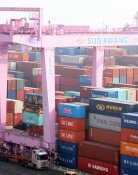Is the North Korean Nuclear Issue Headed for the UN Security Council?
Is the North Korean Nuclear Issue Headed for the UN Security Council?
Posted May. 05, 2005 23:34,
The North Korean nuclear issue seems to be hurtling toward a critical juncture.
Amid speculations that the North is preparing a nuclear test after declaring possession of nuclear weapons, while it continuously refuses to return to the six-party talks, the international community, including the United States, is moving forward to refer the nuclear issue to the UN Security Council.
It is fair to say that, depending on the situation, the world could face a crisis similar to the one in 1994. At that time, the Korean peninsula was faced with a possible war, as the U.S. reviewed the bombing of the Yongbyon nuclear facility in the North. Below is a comparison of the first North Korean nuclear crisis in 1994 with the current nuclear crisis.
What Is the Same and What Is Different?-
In 1994, the Clinton administration of the U.S. immediately referred the nuclear issue to the UN Security Council when the North crossed the red line by extracting nuclear fuel rods. The IAEA Board of Governors adopted a resolution that imposed sanctions on the Communist state.
As of May 2005, Pyongyangs nuclear threat is far more serious than the one of 1994. If its claim proves true, the North has already secured enough plutonium to make 12 to 14 units of nuclear weapons by reprocessing all 8,000 fuel rods. The U.S. points out that the North is operating a highly-enriched uranium (HEU) program. Above all, Pyongyang asserts itself to be a nuclear state.
This is why there are growing voices in the U.S. arguing that the six-party talks are useless and that the nuclear issue should go to the Security Council.
There is difference in what gave rise to the first and second crises. While the first crisis was set off by the Norths plutonium extraction, the second was caused by its nuclear weapons development using HEU. But the two crises share the basic confrontational structure: the U.S. non-proliferation policy and the Norths bid to possess nuclear weapons.
What is notable is that the international environment has changed substantially. A government official said, The biggest change is that China, an outsider during the first nuclear crisis, has now volunteered as a mediator. He also noted, Chinas fourth-generation leadership, including President Hu Jintao, is constantly asking the North to ease the concern of the international community, rather than just siding with the North, as their predecessors did.
Why Isnt the Norths Nuclear Issue Resolved?-
Collision without reconciliation between Pyongyang and Washington makes it hard to resolve the issue.
Yoon Deok-min, a professor at the Institute of Foreign Affairs and National Security, said, It is fair to say that the Bush administration did not hurry to resolve the issue, failing to clearly define the red line, while the Clinton administration tried to prevent the Norths nuclear development with a firm determination.
Moon Jung-in, chairman of the Presidential Committee on Northeast Asian Cooperation Initiative, also recently pointed out the U.S.s attitude, saying, The U.S. has not sincerely negotiated with the North.
Former U.S. President Jimmy Carter visited Pyongyang when the 1994 crisis reached its high point. Then North Korean leader Kim Il Sung, on his part, expressed his willingness to freeze the nuclear program to President Carter, which led to the resolution of the crisis. The two countries agreed in the Geneva Agreement in October of the same year that the North would freeze its nuclear facility, while the U.S. would offer a light water reactor in return.
A Unification Ministry official commented, It seems that a hard-line policy as opposed to reconciliation prevails in the North, while hard-liners are garnering more power.
Will It Go to the Security Council?-
Shin Sung-ho, a professor in the Graduate School of International Studies at Seoul National University, said, If someone asks me if the six-way talks are meaningful at all and if it is possible to resolve the nuclear issue through dialogue, I would say that the situation is at a make-or-break crisis.
A Foreign Ministry official also said, It is realistic to say that a resolution through negotiation is hard, as theres only a slim chance that Pyongyang and Washington would change their stances, adding, Inevitably, there will be an escalation of tension through discussion on sanctions due to the submission of the issue to the Security Council.
He also said, It is the management of a possible crisis for which the government should prepare. The government should revive a window of dialogue with the North, while strengthening cooperation with the U.S.
taewon_ha@donga.com







